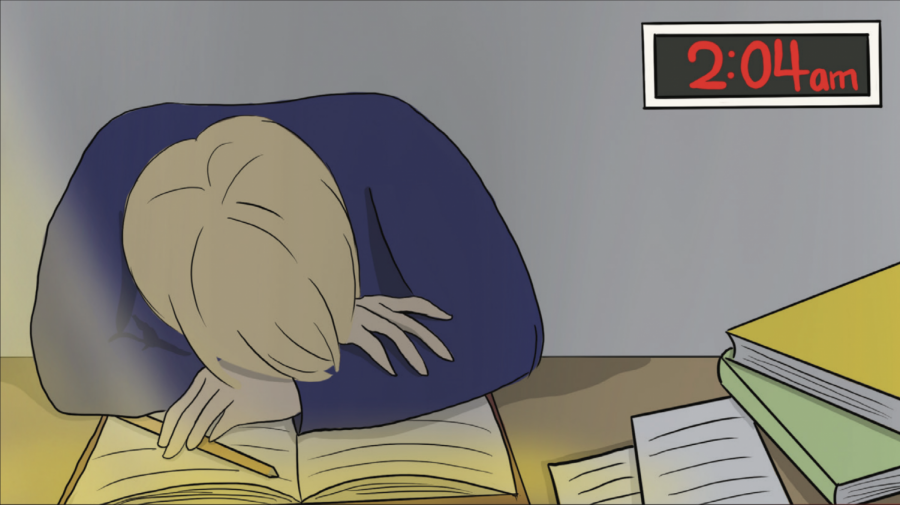Teachers always remind their students of two basic necessities the day before a big test: eat a good breakfast, and get a good night’s sleep.
Consuming a nutritious breakfast stimulates brain power and provides energy, while sleeping the recommended seven or eight hours daily gives brains a chance to rest, according to a University of the People article.
It is true that these necessities are important, but they are not realistic for current high school students.
As students continue to normalize sleep deprivation (a temporary or chronic state of not receiving enough sleep), it seems like sleeping less than six hours every night is a feat worth bragging about.
High school students should strive for at least seven hours of shut-eye daily to obtain a healthier mind and body, according to the Sleep Foundation, a OneCare Media Company that licensed its information from the National Sleep Foundation.
Instead of taking a break from studying for an exam, students often pull all-nighters, expecting all their hard work and lack of sleep to pay off when taking tests. Other students tend to pull all-nighters because they procrastinated and did not study until the night before.
In reality, their lack of rest results in decreased cognitive performance, leading to a lack of concentration during class. In fact, the cognitive performance of someone who has been awake for 17 hours is the same as someone with a blood alcohol concentration of 0.05%, according to a Natural Partner Journal article. Their impaired thinking shows similarities to those of intoxicated people.
Aside from receiving lower grades on assessments or losing focus during lectures, sleep deprivation causes other issues such as an increased risk of depression, drowsy driving accidents and decreased athletic performance — all of which are issues high school students can relate to, according to a Sleep Foundation article.
Another document from the same group states that changes in the function of serotonin, a neurotransmitter in the brain, result in sleep issues that contribute to the development of depression.
If students lose interest in school or their grades because of depression, their future could be negatively affected. In addition, a 2015 study of nearly 28,000 high school students demonstrated an association between every hour of rest lost from the recommended amount of seven or eight hours and a 38% increase in the risk of feeling hopeless and sad.
Furthermore, sleeping the recommended amount means that students can be better prepared for their exams, which leads to academic success, according to the American Academy of Sleep Medicine.
Many Sunny Hills students attend a four-year university after graduation, and good grades play a critical role in getting college admissions. According to Collegiate Gateway, 81% of colleges that the National Association of College Admissions Counselors surveyed in 2017 allots significant importance to grades.
Students’ GPAs could be better if they were well-rested. Dozing the right amount of hours gives someone a 0.14 higher GPA advantage compared to someone who is constantly sleepy, according to J. Roxanne Prichard, the scientific director of the Center for College Sleep at the University of St. Thomas.
Instead of allocating time to study, closing the textbooks and heading to bed might be the better solution for a higher test grade.
Not only does a lack of sleep affect students’ education, but it can also put those who drive at risk of accidents and serious fatal consequences.
Many students drive early in the morning to get to school, which can result in traffic accidents because of a lack of sleep and increased stress levels, according to another Sleep Foundation article.
An insufficient amount of sleep can cause disruptions in brain parts that control the circulatory system — which circulates blood and lymph throughout the body and inflammations that lead to blood clots.
Developing and overcoming sleep deprivation can be considered a temporary accomplishment in high school when major health problems do not seem like a concern. But creating a cycle with constant inadequate sleep will only cause future complications.
To prevent possible health issues, students need to develop better rest habits to carry with them to college and life after graduation. Not only will their grades benefit, but they will also be better prepared for the workload they will have to juggle in college and during their careers.
High school journeys include many peaks and valleys, but striving through each school day with an exhausted body and brain should not be an added burden.














